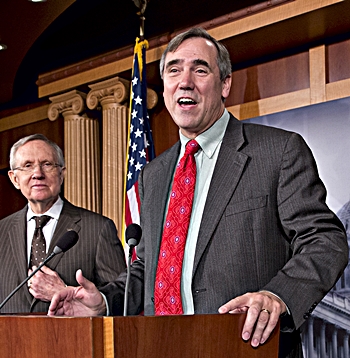Here are 5 problems with Merkley’s 2014 big-government agenda

By Dustin Hurst | NorthwestWatchdog.org
Oregon U.S. Sen. Jeff Merkley’s 2014 Middle Class Agenda has all the right buzzwords that will surely grab some headlines in an election year — good-paying jobs, minimum wage and economic growth.
HE’S GOT A PLAN: U.S. Sen. Jeff Merkley’s 2014 Middle Class Agenda reads more like a progressive wish list than a template for economic prosperity.
Unfortunately for Oregonians, the document, which reveals the Democratic senator’s playbook for the year, reads more like a progressive wish list than a template for economic prosperity. Instead of seeking free-market principles that create real and sustained long-term growth, the senator wants more government, more redistribution of wealth and more binge spending.
To be sure, Merkley’s plan is unlikely to succeed, as he and American deals with the results of a divided government. Democrats and Republicans can agree on little, saying nothing of the senator’s ambitious and overly optimistic plans.
Still, the document warrants a close look, as voters will decide later this year if they want to retain the senator for another term. So, for your enjoyment, here are the five major problems with Merkley’s Middle Class Agenda:
1. Raising the minimum wage doesn’t really help that much
Though politically popular, raising the minimum wage doesn’t really help poor Americans all that much. On this issue, the Oregon Democrat aligns himself in lockstep with President Barack Obama, who last month called on Congress to raise the pay standard to $10.10 an hour during his State of the Union address.
That may make for good politics, but it does little for families struggling to pay rent, buy groceries or fix an ailing vehicle. In a 2010 article for the Southern Economic Journal, academics Joseph J. Sabia and Richard V. Burkhauser destroyed the concept that government wage-setting really can do that much to help families.
“While reducing poverty among the working poor is a laudable policy goal, the evidence suggests that minimum-wage increases have thus far provided little more than symbolic support to this population,” Sabia and Burkhauser wrote in the document.
Further, the duo said that increasing the wage floor will lead to job loss.
“While an increase in the minimum wage will lift out of poverty the families of some low-skilled workers who remain employed, other low-skilled workers will lose their jobs or have their hours significantly cut, reducing their income and dropping their families into poverty,” they wrote.
2. The rich already pay their fair share — and much more
Merkley calls for Congress to “ask the wealthiest to pay their fair share.” Other than that banal talking point, the senator doesn’t offer much as to how he’d like to see taxes go up on the rich.
Maybe the senator is conveniently ignoring some realities of his tenure in office. Since he stepped into the post in 2009, Congress has raised taxes several times, most notably through Obamacare to the tune of $317 billion and the 2013 fiscal cliff legislation, which spiked taxes by $617 billion.
The senator also ignores the data about who really pays taxes — the wealthy. A 2012 report from the nonpartisan Congressional Budget Office revealed that the rich earned about 50 percent of American income while paying 70 percent of the taxes. Many citizens on the low-end of the economic scale actually receive money back each year thanks to refundable tax credits.
3. Merkley cannot stop special interest in Washington, D.C. — or his own campaign chest, apparently
To garner populist support from the anti-D.C. crowd, Merkley boasts that he wants to end special interests’ stranglehold on the legislative process. It’s an admirable goal, for sure, but unachievable because the senator’s war chest is stuffed with special interest cash.
Take a quick look at this OpenSecrets.org campaign contribution profile. Notice anything? Some of the senator’s biggest donors are labor unions, health insurance companies and radical environmental groups like the League of Conservation Voters.
Are those groups not special interests?
4. Universal pre-k initiatives just won’t work and will waste billions
Merkley supports Americans getting a good education. That’s great. He also support universal, federally funded pre-kindergarten, which is bad.
Sure, pre-k provides a nice babysitter for the kids so the parents can go to work and make more money, but according to the federal government’s own research, preschool does little else. A government study released in 2010 detailed the damning findings: “It found that, by the end of the first grade, children who attended Head Start are essentially indistinguishable from a control group of students who didn’t.”
Keep in mind that news comes after spending $166 billion in taxpayer cash on pre-k.
5. What it doesn’t say: Merkley’s votes have hurt small businesses
In the document, Merkley offers his belief that the small business is the lifeblood of the American economy and that government should do what it can to support and strengthen small companies.
While the senator’s blueprint is important for what it says, it’s also important to note what it doesn’t say. Merkley supported the final passage of the Affordable Care Act, Obama’s signature health care initiative. And that law, with its never-ending rules and regulations, makes life tougher for small businesses.
A U.S. Chamber of Commerce survey of its membership released last year revealed that a full 71 percent of small businesses surveyed said the health care law makes hiring difficult. Some businesses hit by the law’s employer mandate say they plan to cut hours or positions to cope with the law.
Additionally, Politico likened the coming health insurance rate increases for small businesses to “another political time bomb” that could explode before the 2014 elections.
Contact Dustin Hurst at Dustin@Watchdog.org or @DustinHurst on Twitter.
The post Here are 5 problems with Merkley’s 2014 big-government agenda appeared first on Watchdog.org.







